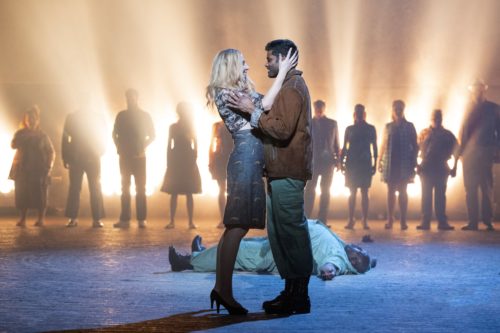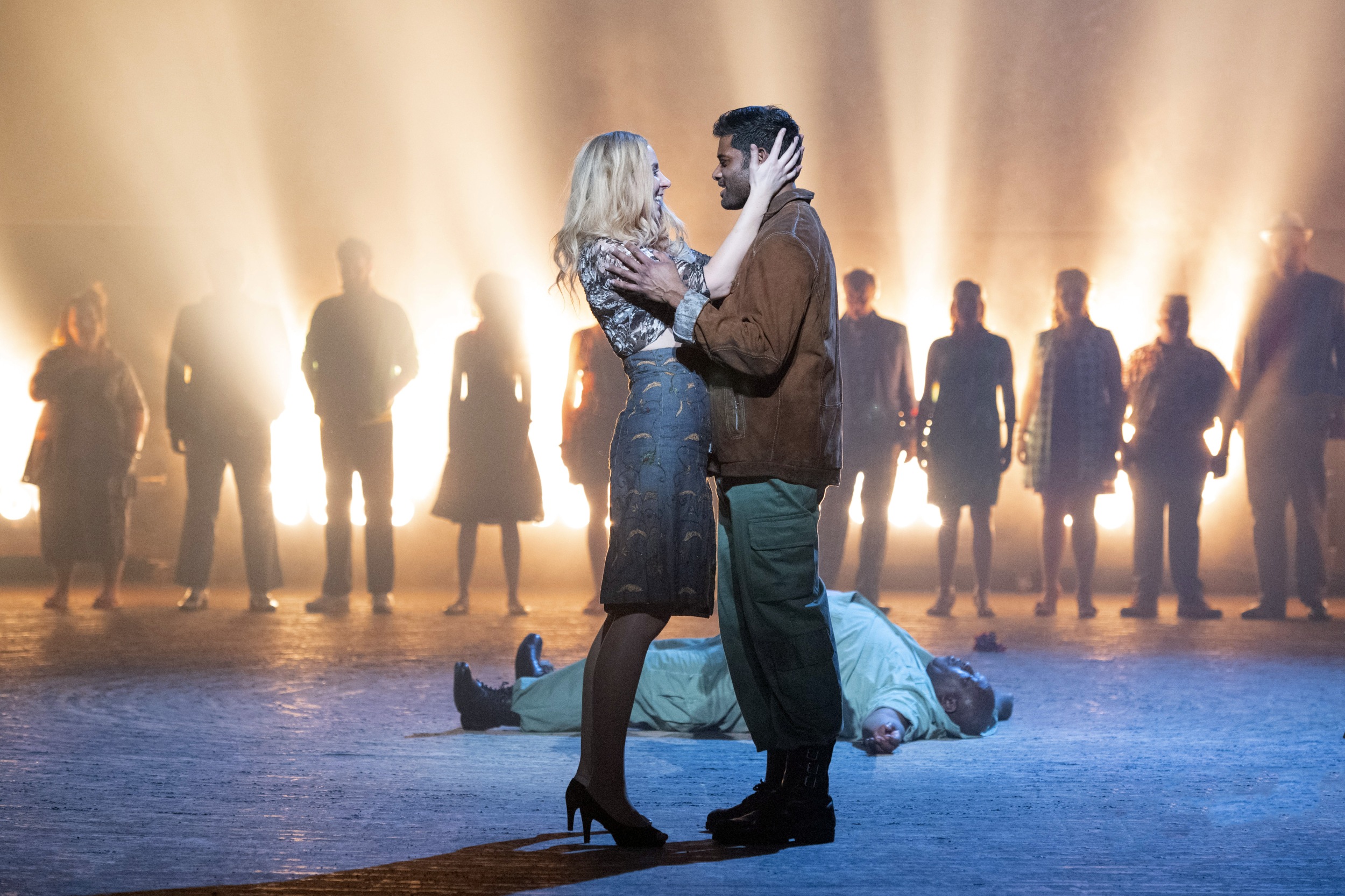 United Kingdom Bizet, Carmen: Soloists, Pupils from Ark Academy, Chorus and Orchestra of English National Opera / Valentina Peleggi (conductor). London Coliseum, 7.3.2020. (CC)
United Kingdom Bizet, Carmen: Soloists, Pupils from Ark Academy, Chorus and Orchestra of English National Opera / Valentina Peleggi (conductor). London Coliseum, 7.3.2020. (CC)

Production:
Director – Calixto Bieito (revived by Jamie Manton)
Set designer – Alfons Flores (realised by Kieron Docherty)
Costume designer – Mercè Paloma
Lighting designer – Bruno Poet (revived by Martin Doone)
Cast:
Carmen – Justina Gringytė
José – Sean Panikkar
Escamillo – Ashley Riches
Micaëla – Nardus Williams
Zuniga – Keel Watson
Moralès – Alex Otterburn
Frasquita – Ellie Langthorne
Mercédès – Susanna Price
Dancairo – Matthew Durkan
Remendado – John Findon
Lillas Pastia – Toussaint Meghie
Both my colleague Mark Berry (click here) and, from an air-conditioned cinema, Jim Pritchard (click here), have previously reported on Calixto Bieito’s staging of this most popular of operas. Bieito’s Don Giovanni at this house was a magnificent operatic moment for all concerned (see my review of a September 2004 performance click here). Hopes were high and, if Bieito’s Carmen is not quite as revolutionary and defining as his Giovanni, it still sets the bar high.
Setting the piece in a liminal, minimal space only emphasises the dark forces at work here. It is intended as a border space; set in post-Franco times, or at least the end of his regime, we are afforded totems of Spain, if anything at all, rather than technicolour evocations. An image of a bull; a tattered telephone box, a plethora of cars (something of a Bieito thing – remember the rumpy-pumpy in the car in Don Giovanni?). The general blackness is counterpointed by the colours of the chorus. Hugely atmospheric, it was as if we penetrated to the heart of Carmen’s world. Lighting is superbly utilised, the circle of light in the final act – out of which no-one can leave – the apotheosis of this. No-one can escape their fate here; much as the Don could not escape the Commendatore. It is, after all, written in the cards, with the Death card taken by all in its literal meaning. The remorseless hand of fate is present from the very beginning in Bieito’s darkness, the bare stage speaking volumes as the opera reaches its denouement.
Driving the drama is ENO Mackerras Fellow Valentina Peleggi. Her conducting is dynamic yet detailed; rarely if ever at ENO have the lines of the orchestral contribution been so finely honed, and the orchestra clearly loves her, on top form throughout. Chiselled rhythms, a full realisation of the colourful orchestration, a deep grasp of the ongoing dramatic thrust were all in evidence, as was a willingness to relax into the lyricism where appropriate (as in the José/Micaëla passages in the first act around what in French would have been ‘Parle-moi de ma mère’); and now the run has settled in, ensemble problems were minimal. The wonderfully reedy bassoon at the beginning of the second act particularly merits mention.
Perhaps it is fitting to give the chorus first word of the vocals: one of the glories of ENO, they can be a force of nature – as here. And coupled with the children from Ark Academy, at one point all lined up stage-front, a riot of sound and colour, it was as if their collective persona was irresistible.
The titular role here is taken by Lithuanian soprano Justina Gringytė, a former ROH Jette Parker Young Artist. This is a reading of huge maturity, of cut-glass vocal gleam and, at times, pure vocal heft. Dramatically, Gringytė positively owns the role. We feel her passion, but we feel for her as the damaged heroine. Her (Don) José is Sean Panikkar, a singer of passion and authority, hopelessly in lust with Carmen, and it is the path of that lust that destroys him. We see and feel the road of his dissolution throughout the course of the evening. Panikkar’s voice is powerful and ardent, a superb match for his Carmen; his acting superb.
ENO Harewood Artist Nardus Williams is a superb Micaëla, her voice the perfect foil for the José in their passages together; perhaps only in the third act did her voice sound a little weak; but there is certainly no denying the power of the moment that she spits at Carmen.
Interesting to see Ashley Riches here, owning the role of Escamillo. He seems to inhabit completely everything he touches. His characteristic vocal power and stage presence both needed here, his ‘Votre toast’ equivalent (the Toreador moment) wonderfully projected, and, after the chorus has entered, his voice seamlessly entering the vocal tapestry. Keel Watson was the epitome of male brutishness and thuggery as Zuniga.
Ellie Langthorne was a deliciously fresh-voiced Frasquita, again superbly paired with another gypsy, Samantha Price’s strong Mercèdes. Ultimately more satisfying even than Barrie Kosky’s Royal Opera production (click here), this Carmen cuts straight to the power inherent in Bizet’s score. No succession of well-known and adored tunes, this. How wonderful to hear the ENO band at the height of its powers, while the strength of ensemble in the casting is another defining factor of this ENO revival. Bravo.
Colin Clarke
For more about ENO click here.
